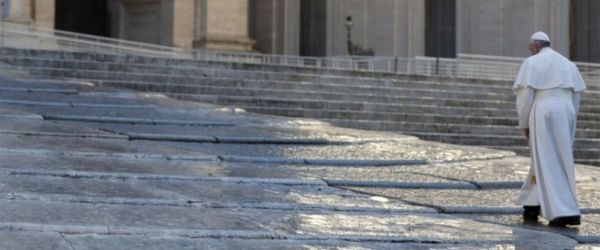In the inevitable "tribulations of life" Christians must entrust themselves to the Lord in prayer, with the certainty of receiving that "true peace" that infuses "courage and hope". Pope Francis said this in the Mass celebrated Tuesday morning, 5 May, in the chapel of the Casa Santa Marta.
"In today's liturgy," Francis was quick to point out, "there are three words that can help us in our journey of faith and hope". Thus, he explained, in the Collect Prayer "at the beginning of the Mass we asked the Lord to strengthen our faith and our hope". And "these three words that come in these readings are 'tribulations', 'entrustment' and 'peace'".
The Pope recalled what happened to Paul, according to the account in the Acts of the Apostles (14:19-28): after being beaten, he was dragged out of the city to be stoned. And "those who persecuted him believed that he was dead". Thus, Paul "suffered", but then, "when he recovered", he gave the advice to remain "firm in the faith because we must enter the kingdom of God through many tribulations". Francis recalled that 'tribulations await us in life: it is part of life to go through dark moments, difficult moments'.
But Paul's advice "to enter the kingdom of God through many tribulations is not a sadomasochistic attitude: it is precisely the Christian struggle". And the reason, the Pontiff explained, is that, as Jesus says, "the prince of this world comes, is near and tries to detach us from the very kingdom of God, from the word of Jesus, from faith, from hope". That is why "we asked the Lord to strengthen our faith and hope".
"Tribulations" are there, then. But Jesus encourages us to have courage: 'I have overcome the world'. And 'he is right above the tribulations, he helps us to go on'. Significant, in this regard, are the words chosen by Jesus to explain "the parable of the sower": when "he speaks of the seed that falls in stony ground, he says: it is like a person who receives the word with joy and then in the moment of tribulation does not feel like it, becomes discouraged and fails".
Here then is the meaning of 'enduring tribulations'. And 'endure', Francis said, 'is a word Paul uses a lot: it is more than having patience, it is carrying on one's shoulders, bearing the burden of tribulations'. Even "the Christian's life has moments like this". But "Jesus says to us: 'Have courage in that moment. I have overcome, you too shall be victorious'". So "this first word enlightens us" to face "the most difficult moments in life, those moments that also make us suffer".
Francis then recalled that Paul, 'after giving this advice, organises that Church, prays over the presbyters, lays his hands on them and entrusts them to the Lord'. And here, then, is the second word: 'reliance'. Indeed, "a Christian can endure tribulations and even persecutions by entrusting himself to the Lord: only he is able to give us strength, to give us perseverance in the faith, to give us hope".
We must know how to 'entrust something to the Lord, entrust this difficult moment to the Lord, entrust myself to the Lord, entrust our faithful, us priests, bishops, entrust our families, our friends to the Lord'. We must know how to say to the Lord: 'Take care of these, they are yours'.
However, the Pope pointed out, it is 'a prayer that we do not always do: the prayer of entrustment'. It is a beautiful Christian prayer to say: 'Lord I entrust this to you, take it forward'. It is 'the attitude of trust in the power of the Lord, also in the tenderness of the Lord who is Father'. So 'when you make this prayer - but a real one, from the heart - you feel that this person who has been entrusted to the Lord is safe: he never disappoints'.
In short, 'tribulation makes you suffer, entrustment to the Lord gives you hope and, from here, comes the third word: peace'. All this, the Pontiff remarked, "gives you peace". And it is also "what Jesus says as a farewell to his disciples: 'I leave you peace, I give you my peace'", as we read in the Gospel passage from John (14:27-31) taken from the liturgy of the day. But, Francis warned, it is not "a peace, a simple tranquillity". Jesus goes on to specify: "I give a peace that is not the peace that the world gives you", that is, the peace that can give a certain state of tranquillity. Instead, the peace that comes from Jesus "goes inside", it is "a peace that also gives you strength, that strengthens what we have asked of the Lord today: our faith and our hope".
In conclusion, the Pontiff reiterated the "three words" that punctuated his reflection: "tribulations, reliance, peace". We must never forget that "in life we must go through tribulation", because "it is the law of life"; but we must always remember precisely "in those moments" to "entrust ourselves to the Lord". And "he responds to us with peace". In fact "the Lord is Father who loves us so much and never disappoints," the Pope reaffirmed. He went on to ask that God "strengthen our faith and our hope", giving us "the confidence to overcome tribulations, because he has overcome the world", and "giving everyone his peace".
[Pope Francis, S. Marta homily, in L'Osservatore Romano 06/05/2015]












